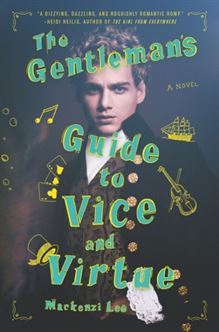Mackenzi Lee’s debut novel, “The Gentleman’s Guide to Vice and Virtue,” confronts multiple issues in a timeless and unprecedented manner and leaves a message of self-love and forgiveness.
The main characters, Monty and Percy, have done everything together, the way best friends do. They grew up together, slept in the same bed and shared a couple of women and drinks along the way. Naturally, a year-long escapade through the great cities of Europe with one another should be ‘same sh**, different day,’ right? Sadly, this is not the case.
On top of Monty’s raging battle between hiding his planet-sized crush on Percy, the plot involves an alchemic heart that could cure any disease, an over-ambitious ex-prime minister who wants that heart, and a secret that changes the mission of the Grand Tour, all along with Monty’s younger sister who has a sharp tongue.
At every turn, Lee tosses Monty, Percy and Felicity curveball after curveball. The novel and the characters’ combined personalities yank out laughter until the reader comes to the realization that each laugh is at someone’s expense. Monty’s well-placed quips about wine are not just for laughs, but border on obsessive. Percy is not nearly as reserved as Monty believed and not nearly as well off either. Felicity’s beef with Monty goes beyond a normal sibling spat.
Through that pain, through the trial and above the fantasy of the plot, we get a story of forgiveness. This is not a fairy tale. The characters do not realize their problems and pull a “Bob the Builder” on them. Lee places emphasis on the fact that Monty still does not fully grasp his privilege even after being told about it, that Percy had to repeatedly tell Monty he was okay with his disability, that Felicity still had to prove herself before she was given due credit, and that Felicity and Percy were slow to grasp the amount of damage that Monty’s abuse wrought on him. Just like how in reality we have to undo years of internalized isms, these characters have to work to undo stigmas and stereotypes.
At the end, what we get is three close friends, family even, working to forgive themselves and each other for their shortcomings and accepting themselves as they are. Self-love is slow coming, but it comes and that message is important.



